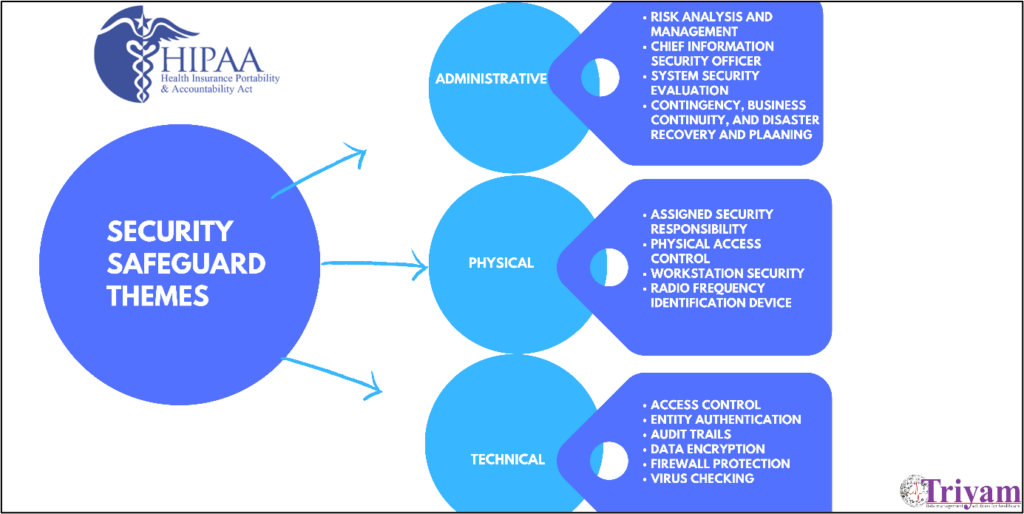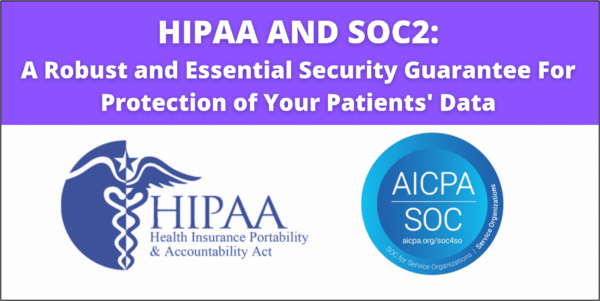The healthcare industry deals with a large amount of data constantly. This data includes PHI (Personal Health Information) and PII (Personal Identifiable Information.) Such sensitive information of patients is always vulnerable and at risk, due to hackers and bad actors that try to steal it and sell it in illegal markets. To protect the privacy and confidential information of patients, federal law compliance of HIPAA (Health Insurance Portability and Accountability Act) and the security assessment of SOC2 (System and Organizations Controls) were introduced. Both of these security standards, help in protecting and sharing PHI.
Healthcare organizations along with their technology providers need to be HIPAA compliant and must try to implement additional security standards such as SOC2 to manage and share sensitive information with appropriate measures to avoid breaches and violations.
Here is all you need to know about these security laws and measures.
This article discusses the following:
- HIPAA Compliance: Protecting PHI and PII
- SOC2 Compliance: An Essential Security Measure
- The reasons healthcare organizations and providers need to have HIPAA and SOC2 security measures.
- Triyam: We are HIPAA and SOC2 Compliant!
1. HIPAA Compliance: Protecting PHI and PII
The HIPAA (Health Insurance Portability and Accountability Act) is a federal law that protects the privacy of patients and prohibits the sharing of their PHI or PII in their medical records, insurance information, with other parties, without their consent.
The HIPAA Rules constitutes of:
- HIPAA Privacy Rule: Provides instructions on protecting, managing, and sharing of PHI and PII in medical records and insurance
- HIPAA Security Rule: Provides instructions on managing and sharing electronic PHI (ePHI) via its administrative, technical, and physical safeguards
- The HIPAA Breach Notification Rule: Provides instructions that a healthcare organization and associated partners must follow during a breach
- HIPAA Omnibus Rule: An amendment extending the HIPAA laws to business associates and subcontractors
- HIPAA Enforcement Rule along with HITECH Act: Ensures a mandatory Business Associate Agreement (BAA) to be signed attesting to being HIPAA Compliant by organizations, providers, business associates, etc.
HIPAA monitors three safeguards that ensure the complete security of PHI and PII such as:
- Administrative Safeguards
- Technical Safeguards
- Physical Safeguards

Thus, HIPAA Compliance involves the tracking and following of HIPAA mandated rules, conducting HIPAA training, conducting audits and risk assessments, real-time monitoring, and maintaining a HIPAA compliant workplace and system by following all the three HIPAA security safeguards.
2. SOC2 Compliance: An Essential Security Measure
The SOC2 (System and Organizations Controls) is a security compliance standard, defined by AICPA (the American Institute of Certified Public Accountants) that specifies how technology providers must securely manage patient data in the cloud. This extends to third-party vendors as well. The SOC2 ensures that every SAAS company does proper managing and sharing of PHI and PII to protect the interests of their clients.
SOC2 follows five trust service criteria (TSC) namely security, availability, integrity, confidentiality, and privacy.
The SOC2 provides two types of audit reports:
- Type 1 Report helps in providing an analysis of a company’s system and controls in place which agree with the SOC2 TSCs, for a particular date.
- Type 2 Report helps in providing an analysis of a company’s security practice throughout a period and their system’s operational efficiency. This form of analysis is more dependable, as it shows that a company can manage and share data with proper security.
SOC2 Certification is provided by external auditors to service providers, who can use the same to prove their credibility and commitment to data security and privacy.
3. Reasons healthcare organizations and providers need to have HIPAA and SOC2 security measures
Healthcare organizations and providers must seek HIPAA and SOC2 compliance, as they can help improve patient care, build trust, avoid data loss, and save costs, among several other benefits.
• Improved patient care
The protection of the privacy of patients must be the main priority when dealing with PHI or PII. HIPAA and SOC2 ensure the protection of all aspects of security, from administrative, physical, to technical, thus, ensuring the complete safeguard and protection of patient data. This is both beneficial for the healthcare organization managing the patient data, and the patients themselves who gain authority over their PHI and PII usage, thus ensuring improved patient care.
• Builds trust between parties
With the help of HIPAA Certification and SOC2 reports, healthcare facilities can confirm that their technology service provider is taking proper proactive measures and protocols while dealing with their patients’ data. Being HIPAA and SOC2 guarantees healthcare organizations that there is a very little chance of data breach and security risks that can be caused by the provider, thus, building trust and credibility between the parties.
• Helps avoid breaches and other harmful threats
Technology today has evolved to a completely new standard, with innovation becoming the norm. This growth, however, does not just pertain to modern technology by providers but includes the upgraded malicious programs designed by hackers as well.
According to the HIPAA Journal, between 2009 and 2020, 3,705 healthcare data breaches of 500 or more records have been reported to the HHS’ Office for Civil Rights. Those breaches have resulted in the loss, theft, exposure, or impermissible disclosure of 260M+ healthcare records. That equates to more than 81% of the population of the United States.
Such violations due to breaches demonstrate the relevance of ensuring appropriate data security measures such as HIPAA and SOC2.
• Cost Saving
Many healthcare facilities do not implement the right security measures to this day, to avoid costs, but fail to understand that this decision in turn could end up costing them a fortune. According to the latest report by IBM, the healthcare sector was the industry with the most expensive data breach cost with the average being $9.23 Million per incident. If such a costly price, was not bad enough, the report suggests that it took 287 days for respondents to identify and contain a breach.
The HIPAA Violations for such breaches are also severe. The largest-ever financial penalty for HIPAA violations was paid by Anthem Inc to resolve potential violations of the HIPAA Security Rule that were discovered by OCR during the investigation of its 78.8 million record data breach in 2015. Anthem paid $16 million to settle the case, as noted by the HIPAA Journal. This is just one of the several cases of breaches that demonstrates how breaches can affect organizations with losses in millions. Such an incident can also affect the reputation of a facility negatively, cause customer dissatisfaction, and business losses. By staying HIPAA and SOC2 compliant such unnecessary expenses can be avoided by healthcare organizations.
4. Triyam: We are HIPAA and SOC2 Compliant!
Triyam is committed to the protection of PHI and PII of our customers while meeting the highest standards of security in the healthcare industry. Triyam provides a HIPAA compliant and SOC2 Certified SaaS Solution and uses industry-standard processes, strategies, and infrastructure to secure PHI data during data conversion, archival, migration processes as well as when stored within its cloud product, Fovea application, hosted in Microsoft Azure. Learn more about what we do at: https://triyam.com
Read more about why a cloud product that is HIPAA and SOC2 Compliant may be the right solution for your healthcare organization: https://triyam.com/articles/why-should-healthcare-companies-move-their-data-to-the-cloud

